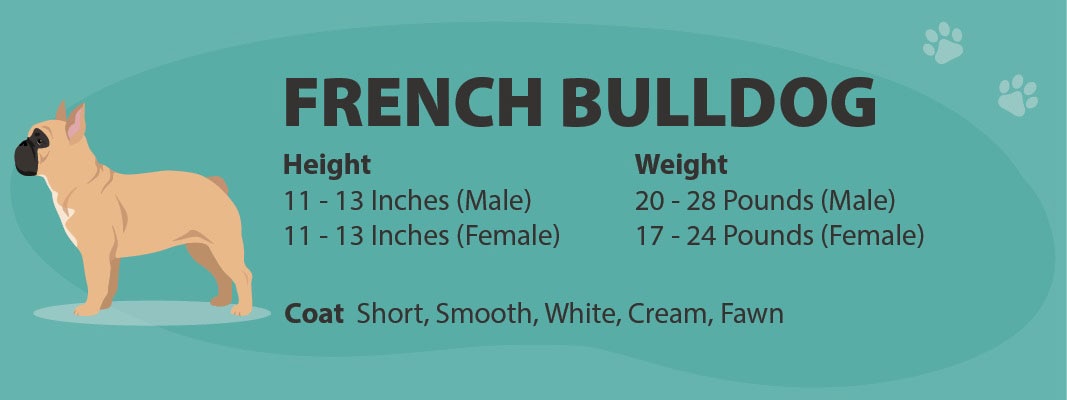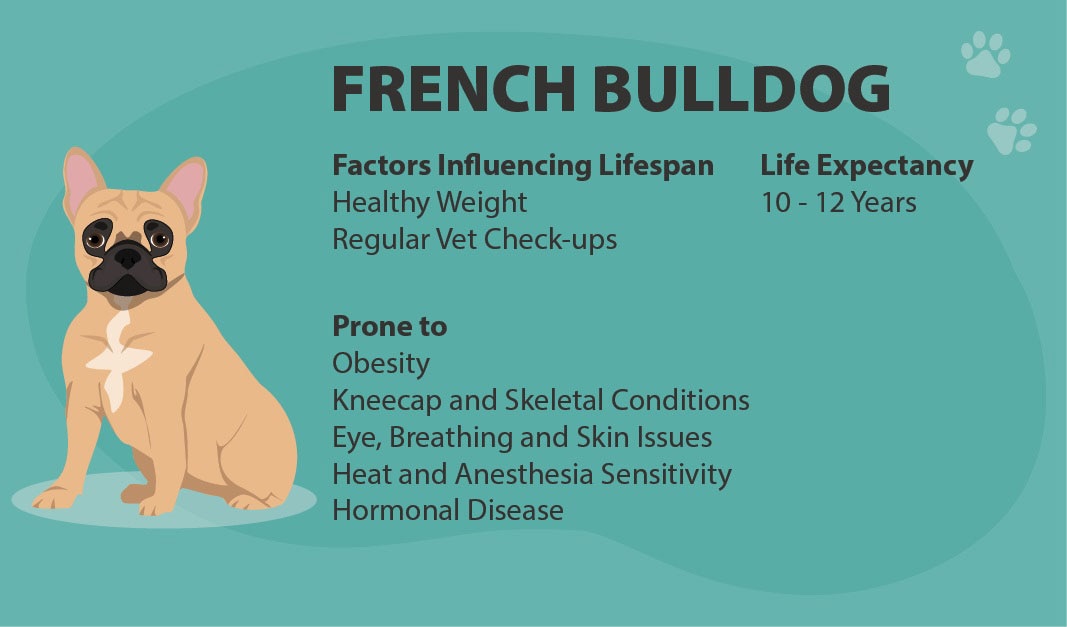French bulldogs, affectionately called Frenchies, are known for their charming personalities and big, bat-like ears. They are, in a word, cute. But are they a good breed for everyone? Learn about French bulldog temperament, health needs and daily care so you’ll know whether this breed is right for you.
About French Bulldogs
Frenchies developed in the mid-to-late 1800s, when miniature English bulldogs who had accompanied their owners to France were crossed with other breeds to develop their trademark "bat ears." The dog was a hit with Parisian society and eventually made its way to the United States, where American breeders and fanciers resisted a movement to return Frenchie ears to their more rounded, traditional bulldog shape.1
French Bulldog Appearance

Essentially, Frenchies look like small English bulldogs with big ears. They have a square-shaped head with a flat, wrinkled face and a pronounced underbite. Their large, erect bat ears are what primarily distinguish them from the English bulldog.2
Frenchies are small to medium dogs, standing 11 to 13 inches at the shoulder.1 Males weigh between 20 and 28 pounds, while females weigh between 17 and 24 pounds.3 They have compact, barrel-shaped bodies with short tails that can either be straight or screw-shaped.2
They have short, smooth coats covering loose, wrinkly skin and they may be solid, brindled or piebald. Markings may also include a black mask, black shading on the face, white markings and ticking. Colors include white, cream and fawn.2
French Bulldog Temperament
These are generally well-behaved, easygoing and happy dogs who are loving and playful.2
They’ve been described as clowns and goofballs. They’re not lazy couch potatoes, but they’re also not hyperactive and they won’t run you off your feet. Frenchies aren’t very vocal and they’re not big barkers, although they are alert enough to let you know when something’s amiss.1
This breed has a bit of a stubborn streak, but they’re bright and learn well as long as training is fun and rewarding.4 Early socialization can keep them from becoming shy wallflowers.5 And a well-socialized Frenchie can get along with just about everybody.1
Living With French Bulldogs
What sort of home is best for a French bulldog? Here are some insights and tips on living with and caring for a Frenchie to help you decide whether this breed is a good fit for your home and lifestyle.
Who they're best for
These sturdy little dogs are highly social and companionable and can fit into families of any shape or size.4 But they’re prone to separation anxiety, so they need a home where they can spend most of the day with a human or animal companion.5
Living space
Frenchies are ideally suited to city and apartment living.1 But they can also adapt to the country or suburbs.4
Exercise and activity
Frenchies don’t need a lot of exercise. They do well with a daily walk to sniff their way around the neighborhood or a fenced yard to roam and play. French bulldogs are not made for swimming and should be closely supervised near pools, including kiddie pools. They also shouldn’t be left alone in the tub.1
French bulldogs don’t bark much and tend to be mostly silent partners.4 Despite that, they make good watchdogs, quick to speak up and alert you to perceived dangers.4 One caveat to the silent part: They’re loud and heavy snorers, which is par for the course with brachycephalic — that is, flat-faced — breeds.6
Grooming
Frenchies are generally low-maintenance when it comes to grooming. Monthly baths and weekly brushing are usually enough to keep their coats in good condition.5 Extra care should be taken with cleaning and drying between wrinkles and skinfolds, and ears should be checked regularly and cleaned as needed.7
Otherwise, nails should be trimmed once or twice a month,1 and brushing their teeth a few times a week can promote healthy teeth and gums.
French Bulldog Health and Life Expectancy

The average life expectancy of the French bulldog is 10 to 12 years.1 But each dog is different, and maintaining your Frenchie at a healthy weight and making sure they get regular checkups at the vet may help them live longer.
Frenchies are prone to obesity, so you’ll need to monitor their weight and take care not to overfeed. Feed them a high-quality dog food that’s suitable for their current life stage, and talk to your vet about the appropriate amount.1
Look for food with a nutritional profile that has the approval of the Association of American Feed Control Officials (AAFCO).8 Avoid giving them table scraps.1 Consider replacing calorie-heavy commercial dog treats with fruits and vegetables that are safe for dogs.
Even with the best preventive care, French bulldogs may still be genetically predisposed to a number of health conditions that both current and prospective owners should be prepared to face.
Patellar luxation
Patellar luxation is an inherited condition that causes the kneecap on the back leg to become dislocated. Less severe cases come and go and may be managed with pain medications. More severe cases may require surgical treatment.9
Hip dysplasia
Hip dysplasia is a skeletal condition that prevents the hip joint from fitting properly into the socket, causing pain and discomfort. Although it's most often seen in large breeds, it can affect smaller dogs as well. Many cases can be corrected via surgery, and diet and lifestyle changes can also help.10
Eye issues
Frenchies may be prone to developing cataracts at a young age. They're also more susceptible to conditions like cherry eye and entropion, both of which affect the dog's eyelids.1
Breathing issues
Frenchies are prone to breathing difficulties. This is due to their flat faces and shortened upper respiratory passages, which can also exacerbate other health issues.6
Heat sensitivity
Frenchies' respiratory issues can make them especially susceptible to heatstroke and other heat-related illnesses.6 They need to be kept inside during the hottest part of the day, limiting outdoor exercise to morning or evening when there’s plenty of shade.7 And they should never be left in a hot car.7
Skin issues
Frenchies are susceptible to developing allergies that cause skin and coat issues. They may also develop autoimmune skin disorders.1
Hypothyroidism
Hypothyroidism is an endocrine disorder that occurs when the thyroid gland is underproductive and causes the metabolic rate to slow down. This can affect all of the body's organs and systems. Signs include fatigue, weight gain, a dull coat and cold intolerance. As with humans, this condition is managed with medication.11
Sensitivity to anesthesia
French bulldogs also tend to be more sensitive to anesthesia.1 Talk to your vet about potential side effects and possible alternatives if your Frenchie needs surgery or other procedures that require them to be placed under general anesthesia.
Buying or Adopting a French Bulldog
Buying a Frenchie from a reputable breeder will likely run you between $2,000 and $7,000 or more.5 Location and genetics are both major factors in determining the price of French bulldog puppies, but the cost typically includes early puppy healthcare and first vaccinations.12
You can also find French bulldogs of any age, as well as Frenchie mixes, at pet shelters and animal rescues. Adopting a Frenchie from a shelter starts at around $400.13 This usually includes the cost of vaccinations, spaying or neutering and additional healthcare.14 The French Bulldog Rescue Network can connect you with rescued Frenchies across the nation in need of good homes.
Frequently Asked Questions About French Bulldogs
Here are some answers to frequently asked questions about French bulldogs.
CareCredit Credit Card Financing for Dogs
Taking good care of your pet's well-being from nose to tail is essential. Make sure to stay up to date on their regular checkups at the vet to help keep your pet happy and healthy for a lifetime of love. You can use your CareCredit credit card for pet care throughout the year for routine veterinary services as well as emergencies and surgeries.* Use our Acceptance Locator to find a veterinarian near you that accepts CareCredit.
CareCredit is there for you and your pet every step of the way; continue your wellness journey by downloading the CareCredit Mobile App to manage your account, find a provider on the go and easily access the Well U blog for more great articles, podcasts and videos.
In addition to pet care, you can also use your CareCredit credit card for dentistry, cosmetic, vision, hearing, health systems, dermatology, pharmacy purchases, spa treatments and so much more within the CareCredit network. How will you invest in your health and wellness next?
Author Bio
Jean Marie Bauhaus is a freelance writer and novelist who has been writing pet content since 2013. Her work has appeared on Forbes.com, Hill's Pet, Chewy, AKC.org and more.














